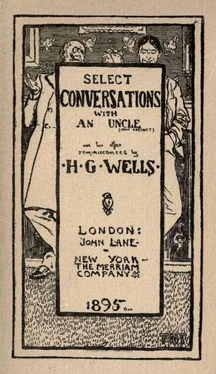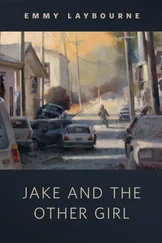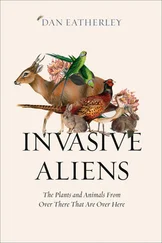Herbert Wells - Select Conversations with an Uncle (Now Extinct) / And Two Other Reminiscences
Здесь есть возможность читать онлайн «Herbert Wells - Select Conversations with an Uncle (Now Extinct) / And Two Other Reminiscences» весь текст электронной книги совершенно бесплатно (целиком полную версию без сокращений). В некоторых случаях можно слушать аудио, скачать через торрент в формате fb2 и присутствует краткое содержание. Жанр: Классическая проза, на английском языке. Описание произведения, (предисловие) а так же отзывы посетителей доступны на портале библиотеки ЛибКат.
- Название:Select Conversations with an Uncle (Now Extinct) / And Two Other Reminiscences
- Автор:
- Жанр:
- Год:неизвестен
- ISBN:нет данных
- Рейтинг книги:4 / 5. Голосов: 1
-
Избранное:Добавить в избранное
- Отзывы:
-
Ваша оценка:
- 80
- 1
- 2
- 3
- 4
- 5
Select Conversations with an Uncle (Now Extinct) / And Two Other Reminiscences: краткое содержание, описание и аннотация
Предлагаем к чтению аннотацию, описание, краткое содержание или предисловие (зависит от того, что написал сам автор книги «Select Conversations with an Uncle (Now Extinct) / And Two Other Reminiscences»). Если вы не нашли необходимую информацию о книге — напишите в комментариях, мы постараемся отыскать её.
Select Conversations with an Uncle (Now Extinct) / And Two Other Reminiscences — читать онлайн бесплатно полную книгу (весь текст) целиком
Ниже представлен текст книги, разбитый по страницам. Система сохранения места последней прочитанной страницы, позволяет с удобством читать онлайн бесплатно книгу «Select Conversations with an Uncle (Now Extinct) / And Two Other Reminiscences», без необходимости каждый раз заново искать на чём Вы остановились. Поставьте закладку, и сможете в любой момент перейти на страницу, на которой закончили чтение.
Интервал:
Закладка:
"You see, it is the custom to have cake."
"Well, anyhow, I intend to break the custom."
"So did I, but I had it all the same."
My uncle looked at me.
"You see," said I, "when a woman says you must do this or that—must have cake at a wedding, for instance—you must do it. It is not a case for argument. It is a kind of privilege they have—the categorical imperative. You will soon learn that."
Evidently the question was open. "But why do they say you must?"
"Other women tell them to. They would despise any one dreadfully who did not have a really big cake—from that shop."
"But why?"
"My dear uncle," said I, "you are going into matrimony. You do not show a proper spirit."
"The cake," said my uncle, "is only a type. There is this trousseau business again. Why should a woman who is going to marry require a complete outfit of that sort? It seems to suggest—well, pre-nuptial rags at least, George. Then the costume. Why should a sane healthy woman be covered up in white gauze like the confectionery in a shop window when the flies are about? And why——?"
He was going on in quite an aggressive tone. "There isn't a why ," I said, "for any of it." This sort of talk always irritates a married man because it revives his own troubles. "It's just the rule. Surely, if a wife is worth having she is worth being ridiculous for? You ought to be jolly glad you don't have to wear a fool's cap and paint your nose red. 'More precious than rubies'——"
"Don't," he said.
"It must be these tradesmen," he began bitterly after an interval. "Some one must be responsible, and it's just their way. Do you know, George, I sometimes fancy that they have hypnotised womankind into the belief that all these uncomfortable things are absolutely necessary to a valid marriage—just as they have persuaded the landlady class that no house is complete without a big mirror over the fireplace and a bulgy sideboard. There is a very strong flavour of mesmeric suggestion about a woman's attitude towards these matters, considered in the light of her customary common sense. Do you know, George, I really believe there is a secret society of tradesmen, a kind of priesthood, who get hold of our womenkind and muddle them up with all these fancies. It's a sort of white magic. Have you ever been in a draper's shop, George?"
"Never," I said: "I always wait outside—among the dogs."
"Have you ever read a ladies' newspaper?"
"I didn't know," said I, "that there was any part to read. It's all advertisements; all the articles are advertisements, all the paragraphs, the stories, the answers to correspondents—everything."
"That's exactly what makes me think the tradesmen have hypnotised the sex. It may be they do it in those drapers' dens. A man spots that kind of thing at once and drops the paper. Women go on year after year, simply worshipping a paper hoarding of that kind, and doing patiently everything they are told to do therein. Anyhow, it is only in this way that I can account for all these expensive miseries of matrimony. I can't understand a woman in full possession of her faculties deliberately exasperating the man she has to live with—I suppose all men submit to it under protest—for these stale and stereotyped antics. She must be magnetised."
"They are not stale to her," I said.
"Mrs Harborough——" he began.
"Of course, a widow!—I forgot," I said. "But she seems so young, you know."
"And putting aside the details," said my uncle, with a transient dash of cheerfulness at my mistake; "I object to the publicity of the whole thing. It's not nice. To bring the street arab into the affair, to subject yourself to the impertinent congratulations and presents of every aspirant to your intimacy, to be patted on the back in the local newspapers as though you were going to do something clever. Confound them! It's not their affair. And I'm too old to be a blushing bridegroom. Then think, what am I to do, George, if that cad Hagshot sends me a present?"
"It would be like him if he did," I said. "I fancy he will."
"I can't go and kick him," said my uncle.
"Declined with thanks," I suggested, "owing to pressure of other matter."
"You are getting shoppy, George," said my uncle, in as near an approach to a querulous tone as I have heard from him.
"You are getting married," I replied, with the complacency of one whose troubles are over. "But it's a horrible nuisance, anyhow. Still, the world grows wiser, and the burden is not quite so bad as it used to be. A hundred years hence——"
"I'd be willing enough to wait," said my uncle; "but I'm not the only party in this affair."
He was willing enough to wait, perhaps, but time was inexorable. Save for one hurried interview, I did not see him again for a week, and then it was before the altar. His garrulity had fallen from him like a garment. He was preoccupied and a trifle bashful. He fumbled with the ring. I felt almost as though he was my younger brother.
I stood by him to the end, and at last came the hour of parting. I grasped his hand in silence: silently he mastered a becoming emotion. And in silence he went from me unto the New Life.
A MISUNDERSTOOD ARTIST
The gentleman with the Jovian coiffure began to speak as the train moved. "'Tis the utmost degradation of art," he said. He had apparently fallen into conversation with his companion upon the platform.
"I don't see it," said this companion, a prosperous-looking gentleman with a gold watch-chain. "This art for art's sake—I don't believe in it, I tell you. Art should have an aim. If it don't do you good, if it ain't moral, I'd as soon not have it. What good is it? I believe in Ruskin. I tell you——"
" Bah !" said the gentleman in the corner, with almost explosive violence. He fired it like a big gun across the path of the incipient argument, and slew the prosperous-looking gentleman at once. He met our eyes, as we turned to him, with a complacent smile on his large white, clean-shaven face. He was a corpulent person, dressed in black, and with something of the quality of a second-hand bishop in his appearance. The demolished owner of the watch-chain made some beginnings of a posthumous speech.
" Bah !" said the gentleman in the corner, with even more force than before, and so finished him.
"These people will never understand," he said, after a momentary pause, addressing the gentleman with the Jovian coiffure, and indicating the remains of the prosperous gentleman by a wave of a large white hand. "Why do you argue? Art is ever for the few."
"I did not argue," said the gentleman with the hair. "I was interrupted."
The owner of the watch-chain, who had been sitting struggling with his breath, now began to sob out his indignation. "What do you mean , sir? Saying Bah ! sir, when I am talking——"
The gentleman with the large face held up a soothing hand. "Peace, peace," he said. "I did not interrupt you. I annihilated you. Why did you presume to talk to artists about art? Go away, or I shall have to say Bah! again. Go and have a fit. Leave us—two rare souls who may not meet again—to our talking."
"Did you ever see such abominable rudeness , sir?" said the gentleman with the watch-chain, appealing to me. There were tears in his eyes. At the same time the young man with the aureole made some remark to the corpulent gentleman that I failed to catch.
"These artists," said I, "are unaccountable, irresponsible. You must——"
"Take it from whence it comes," said the insulted one, very loudly, and bitterly glaring at his opponent. But the two artists were conversing serenely. I felt the undignified quality of our conversation. "Have you seen Punch ?" said I, thrusting it into his hand.
Читать дальшеИнтервал:
Закладка:
Похожие книги на «Select Conversations with an Uncle (Now Extinct) / And Two Other Reminiscences»
Представляем Вашему вниманию похожие книги на «Select Conversations with an Uncle (Now Extinct) / And Two Other Reminiscences» списком для выбора. Мы отобрали схожую по названию и смыслу литературу в надежде предоставить читателям больше вариантов отыскать новые, интересные, ещё непрочитанные произведения.
Обсуждение, отзывы о книге «Select Conversations with an Uncle (Now Extinct) / And Two Other Reminiscences» и просто собственные мнения читателей. Оставьте ваши комментарии, напишите, что Вы думаете о произведении, его смысле или главных героях. Укажите что конкретно понравилось, а что нет, и почему Вы так считаете.










